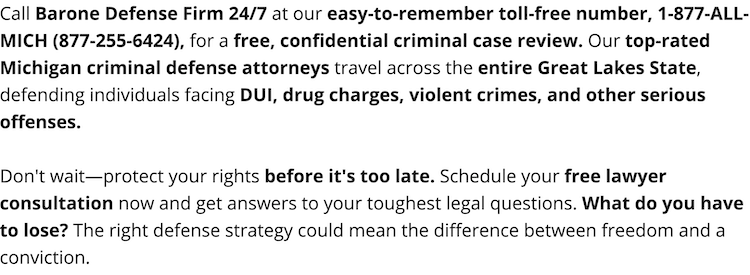Grand Rapids Improper DUI Stops
A motor vehicle stop is a “Constitutional” event because the Fourth Amendment protects citizens from unreasonable searches and seizures. Since most DUI cases begin with a police stop, examining the legality of the stop is the foundation of a strong defense. If the stop was improper or lacked justification, all evidence obtained afterward may be suppressed, potentially leading to the dismissal of your case. At Barone Defense Firm, we focus on identifying these critical errors to protect your rights.
Laws Regarding DUI Stops
Law enforcement must have probable cause or a “reasonable and articulable suspicion” of criminal activity to justify a traffic stop. Common reasons cited for DUI stops include:
- Traffic Violations: Speeding, swerving, failing to signal, or running a stop sign.
- Equipment Violations: Defective lights, missing license plates, or broken mirrors.
- Erratic Driving: Abrupt lane changes, driving too slowly, or failing to maintain lane control.
However, these reasons are not always legitimate. For example:
- Minor Weaving: Slight weaving within your lane may not justify a stop.
- Radar or Lidar Errors: If speed detection devices were not calibrated properly, speeding allegations may not hold.
- Insufficient Equipment Justifications: Some cited violations may be exaggerated or fabricated.
Our investigation doesn’t simply accept the officer’s version of events. We scrutinize every detail to ensure your rights were not violated.
Evaluating the Lawfulness of a Stop
To challenge an improper stop, we:
- Review Police Reports: Analyzing the officer’s stated reasons for inconsistencies or lack of legal basis.
- Consult With You: Understanding your account of events to uncover errors or procedural violations.
- Examine the Scene: Investigating environmental factors like lighting, traffic conditions, or visibility that could affect the officer’s observations.
The Motion to Suppress Evidence
If the stop was improper, we file a motion to suppress evidence collected after the stop. This includes:
- Field sobriety test results.
- Breathalyzer or chemical test results.
- Officer observations, such as the smell of alcohol or slurred speech.
The process involves filing a detailed brief, presenting oral arguments in court, and cross-examining the arresting officer to expose flaws in their case. If successful, the suppression of evidence can lead to dismissal of your DUI charges.
Consequences of an Invalid DUI Stop
When the court rules the stop was unlawful, key evidence is excluded, often leaving the prosecution with insufficient grounds to proceed. This could result in:
- Dismissal of Charges: Without evidence, the case cannot move forward.
- Reduction of Penalties: If evidence is partially suppressed, charges may be downgraded.
Why Choose Barone Defense Firm
Challenging the validity of a DUI stop requires extensive legal knowledge and precision. Our attorneys:
- Have decades of experience in DUI defense.
- Understand the intricacies of Michigan DUI laws.
- Craft personalized defense strategies to protect your rights and minimize consequences.
Contact Us for Expert Legal Representation
If you believe your DUI stop was improper, don’t navigate this complex legal process alone. Contact Barone Defense Firm today. Our skilled attorneys will evaluate your case, uncover weaknesses in the prosecution’s claims, and work tirelessly to achieve the best outcome. Call us now for a free consultation.
 Barone Defense Firm Home
Barone Defense Firm Home
















